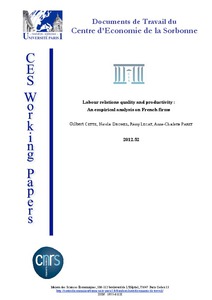Labour relations quality and productivity: an empirical analysis on French firms

Cette, Gilbert ; Dromel, Nicolas L. ; Lecat, Rémy ; Paret, Anne-Charlotte
Université Panthéon-Sorbonne, Paris
Université Paris I - Paris
2012
19 p.
collective bargaining ; enterprise level ; labour relations ; productivity ; trade union
CES Working Papers
52
Labour relations
English
Bibliogr.
"This analysis characterizes empirically how good labour relations can alleviate the negative impact on productivity of regulatory constraints or workforce opposition. Our evidence of good labour relations lies in the existence of binding collective agreements, at the firm or at the industry level. The estimations are based on a unique dataset collected by the Banque de France about the obstacles French firms may face in increasing their utilisation of production factors. Data are an unbalanced sample of 7,441 observations, corresponding to 1,545 companies, over the period 1991-2008. Our main results may be summarised as follows : i) ‘workforce or union opposition' interacted with ‘regulatory constraints' has a negative significant impact on total factor productivity (TFP). Regulatory constraints would become really binding when workers or unions use them as a tool to oppose management's decisions ; ii) ‘regulatory constraints' interacted with ‘branch or firm agreement' has a positive significant impact on TFP. These agreements, which can only be obtained if labour relations are supportive, would be used by firms to offset the negative impact of regulatory constraints. These results confirm that labour relations quality, at the branch or the firm levels, is an important factor of productive performance."
Digital
The ETUI is co-funded by the European Union. Views and opinions expressed are however those of the author(s) only and do not necessarily reflect those of the European Union or the ETUI.